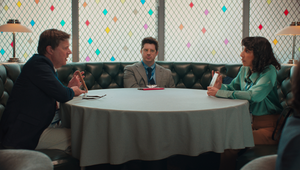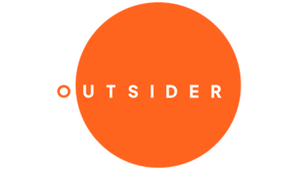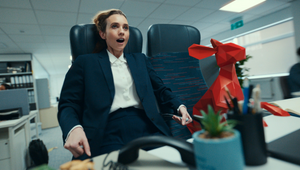
5 Minutes with… Ellen Kuras

Creativity, when you think about it, is an extraordinary ability to marry open-mindedness and single-mindedness. And that’s a balance that director and DP Ellen Kuras has struck to perfection. She spent 23 years creating her Oscar-nominated documentary The Betrayal, a ground-breaking story about refugees of America’s secret war in Laos – all the while carving out a reputation for herself as one of the top cinematographers in Hollywood and building up a directors reel of stunning commercials. Sam Mendes, Spike Lee, Michel Gondry – her feature film collaborators are unarguably impressive. And in the commercial world, where she’s repped by Outsider in the UK and The Corner Shop in the US, she’s helmed a variety of cinematic and smart spots for clients like Nike and Delta Airlines – and most recently hit the industry headlines with a cheeky breast cancer awareness campaign with McCann. LBB’s Laura Swinton caught up with Ellen to hear her amazing stories.
LBB> You came to filmmaking in quite a roundabout way – studying anthropology before moving into photography and photo-journalism. What is it about film as a medium that got you hooked?
EK> I’ve always been interested in people and their stories. When I was a kid I read a lot of stories and I didn’t really see a lot of movies – I lived in a town where there was one movie theatre that often played the same movies for six months straight. It wasn’t a very cinematic experience. I remember I saw this one film and it was basically about the American Indians and it took their point of view, rather than your traditional cowboy story. That struck me as a child and it stayed with me for a long time. Later when I saw the Battle of Algiers, it really cemented in my mind that I wanted to go into film.
Back stepping a little bit, as far as studying anthropology is concerned, my father travelled the world and he was always bringing back stories of different places and people. I was fascinated by the world at large at a very young age. I realised that the world was not my backyard, my backyard was the world. I was interested in small-scale societies and what happens when civilisation tries to bend them into the ‘norm’. The world doesn’t necessarily have to conform to what integrated society thinks is the norm. People can be different although we all have commonalities in our humanity and spirit.
I got very involved in ancient Egypt along the way because my father would bring back books on hieroglyphics. I was interested in Mesopotamia and different places that had different language systems at the beginning of language. All of that drew me into the ancient world and when I went to college at Brown, I was studying classical history, I was studying Latin. There was an art school down the hill and I had always wanted to be a sculptor when I was a kid. At the time I wouldn’t have thought of going to art school because in my family there was such a strong emphasis on academia. So the fact that I was right next to an art school and I could still get credit from taking classes there was a unique opportunity for me – a golden opportunity. There were too many people in the sculpture class so I ended up taking photography – and that class changed my life.
It really made me think in a completely different way. I didn’t want to do academics any more. I had never really been exposed to it before. That’s what I find really interesting about people in the world and students and kids who don’t get that opportunity. You might have a huge talent for something but never be exposed to it in your life.
LBB> The anthropology, the filmmaking and photography seem to come from a very similar urge to get out into the world and meet people.
EK> Exactly. I wanted to learn about people and the ‘why’. I was interested in how people think, how they find meaning, where they find it and how they create it for themselves.
I started taking photography and I got very involved in it. The following year I decided I didn’t want to do classical history, I didn’t want to spend my life in the library. I wanted to go to France and study the theory of meaning, the theory of visual meaning, the idea of propaganda.
After that year in France I came back to Brown and it changed my thinking in a way. I realised I wanted to study people and get more involved in how to say things and translate and put connections together about different cultures. That naturally led to filmmaking because the process was putting it all together and being able to put these connections together.
When I got out of school, independent cinema hadn’t really taken hold and documentary was still in its early stages. It was a time of Jean Rouch, people experimenting with the medium.
LBB> And how did the ‘Betrayal’ come about?
EK> When I lived in Providence a lot of my neighbours were refugees from South East Asia. I got to know them very well and I ended up putting on an exhibition about them in the local museum. I was very interested in what happens when people are dropped into a whole different culture. What do they pick up from the culture that they’re living in? What do they take? What do they leave behind?
These questions were going round my mind about the time that I applied to film school in Poland and I was accepted and I was going to go on a Fulbright grant. But martial law fell and the whole country virtually shut down. I ended up re-writing it to go to Romania – which was a bit crazy because it was at the height of Ceaușescu. A part of me wanted to experience what communism was all about. I wanted to live it. My visa didn’t come through right away, so it felt like it was time to start getting serious about film. I took a little Super8 film in downtown Manhattan and I started working in the film industry.
That led naturally to the Betrayal. When I landed in New York I decided I would try to get my masters while working in film. I worked as a sound engineer, as an associate producer, a producer of shorts for a friend of mine. I did classes whenever I could and at the end of two years I needed to do a thesis film. I decided to do a film about the secret air war in Laos. The United States still hasn’t admitted that we fought that war yet. Millions of people were brought to this country on the basis that they had had connections to this war but it was not recognised. My question was: what does this do to a person’s identity?
It was really difficult to make the film I wanted to do. It was very much before its time. I wanted to make a film that used documentary and narrative elements that would create fiction in the film that would find the spirit of the truth. It wasn’t docu-drama. Whatever I filmed would be the truth for that story. It was like an experiment for me.
I put a script together and got a small grant and went up to Rochester New York to start shooting. I hired a cinematographer who I didn’t really know. I tried to explain where I was trying to get to, this feeling, but when I got the dailies back I realised that he had kind of missed the point. The images were beautiful but they didn’t really have any meaning. So I thought that I would take the camera and try myself. I started making the film but it was very difficult I needed archival footage – and the archival footage was all classified. Laos was still considered a secret country, it was ridiculous.
It was very arduous to track down footage in the library and it was expensive because you had to make duplicate film copies of any footage I could find. I couldn’t find any material that I felt was personal enough. I took it and projected it onto the wall and re-photographed it to give it personality. That’s why it took a while to finish the film; I couldn’t get the material I wanted, it was expensive and I got really busy working on other people’s films because they saw what I was doing. I ended up working as a cinematographer right off the bat because of the work I’d done.
LBB> You collaborated very closely with Thavisouk Phrasavath, who became the editor and a co-director on the film – how did that come about?
EK> In the beginning I wanted to speak Laos. It goes back to my anthropological beginnings. I didn’t want a translator translating for me. I wanted to speak to people myself, so I was looking for someone to teach me and that’s where I met Thavisouk. He would come to my house twice a week after school – he was 19 and he was still at school because he had started late, being a refugee. We immediately hit it off and in the course of our discussions I would ask him questions about his world view. I realised that his story was the story that I wanted to tell. As painful as it was, I realised that I had to leave all that material that I had shot behind me.
LBB> The story about your film The Betrayal is a fascinating one – the fact that you started it at the very beginning of your career and that it evolved over the course of 23 years. How has that experience fed into your approach to filmmaking and, on a personal level, how were you able to find the motivation to push the project forward for so long?
EK> I knew I never wanted to give up on it. The reason being, even if I didn’t have time to work on it, I knew it was a really important story to tell. At times it was really painful. For years and years it was like an albatross on my shoulders.
It was about trusting myself enough and trusting that the material was good enough. I was insecure about it. I didn’t know if people would get it. I finally decided, when the war in Iraq was getting crazy, that I needed to finish it. By that time it was a completely different thing – everybody knew me and they knew my work. Were they going to judge me?
And I realised I couldn’t think about that, move through all those feelings and do what I believed was the right thing. I distinctly remember sitting down one night about midnight and thinking ‘I need to write down everything I want to say in this film, then I can figure out what I can say’.
LBB> It’s interesting listening to your journey; quite often one can roughly categorise directors as those who are all about the story and those whose focus is the craft. Where you’ve come from and the fact that you’re a cinematographer by training means you really put the two together.
EK> I find that some people come out of film school and they have an understanding of the craft but they don’t know what they want to say. If it’s a comment or an interpretation of our world then you have to know the world in order to say something about it – or at least forge an exploration of it. It’s taught me a way of thinking and an openness rather than trying to impose my own presupposition on it. That’s quite key. A lot of people are quite myopic.
LBB> I’m interested in the relationship between your work as a director and your work as a cinematographer. How does your experience as a cinematographer inform your process as a director and vice versa?
EK> One informs the other. Just as documentary informs dramatic films, which informs the commercial advertising point of view. Very early on I was working as an electrician on dramatic films and it completely informed the way I was shooting my own film. That’s why a lot of documentary people were looking at my work and thinking it was unique. I wasn’t putting a typical documentary perspective to it.
I think in the film industry there’s such a desire to categorise people and put them in that box. Are you a director or a DP? I’m both. I work on music films, I work on commercials, I work on dramatic features. It’s all related. Some people are very single-minded while others take a more renaissance approach. I think it’s a paradigm for today’s world, the global market place. You’re not just boxed into one place; your thinking has to be a lot more open and flexible.
LBB> When you’re wearing your ‘director’ hat, do you tend to work with other DPs or do you like to do it yourself? Or does it vary from job to job?
EK> It varies. I like to work with other people but a lot of the things I get are director-DP jobs. I wouldn’t have problems working with anyone else. For me what’s important is what goes on in front of the camera, not all the ego that goes on behind the camera.
LBB> In terms of your advertising work, how do you tend to approach it? I love the beautifully considered, almost photographic, shots that crop up, for example in Nike ‘The Arrival’, Honda and Delta Airlines ‘Reach’. Do you storyboard meticulously or is it a case of reacting spontaneously to what’s around you?
EK> I’m always open to the possibilities in front of me. I would say being a director-DP, it’s hard to keep your eye on everything, I’m doing the job of two people but I’m very spontaneous. I collaborate with the agency, bounce around. I do like being forced to do storyboards because sometimes I hate them! I don’t want to shoot the board, ever. It’s a blueprint. We know what the plan is, but we can depart from that. In movies they like to write a shot list – you can depart from it but at least you have a starting point. So that’s my take on it.
LBB> You’ve worked on some incredible films with some really famous directors. Working with people like Michel Gondry, who have such a strong visual identity and idiosyncratic character in their films, what have you learned from that? Or can it be intimidating?
EK> You know what? The reason I’m able to work with those guys is that I don’t bring my ego into it. And I really try to understand what they’re trying to say. A lot of people get frustrated because they don’t feel like they’re being understood. Like Michel, he’s not the most articulate person in the world so he gets very frustrated, so part of my job is to try to interpret what they want and translate that onto the screen. I’m not intimidated by them. I remember I was doing a job with William Friedkin and people were like ‘oh my god, he’s a screamer, he’s a nightmare’… and I had the greatest shoot with him. We understood each other. I let him tell me what he was trying to say. People have reputations and you have to go beyond that.
LBB> As a director-DP, do have any particular formats you love to work with? Are you a film purist or is digital really exciting?
EK> It really depends on the story that you’re trying to tell. I used to be a film purist but now I’ve opened my mind to the digital world. The last film I shot was a period piece with Alan Rickman and Kate Winslet and so we used film. For the most part, though, it’s the means to a message. I choose the medium that best suits what I want to say. I would still shoot in film if I could but it’s becoming increasingly difficult to do that because there isn’t the support that there used to be. When I was shooting this film in London I kind of got screwed because there were no really good film processing labs.
LBB> And what other recent projects have particularly resonated with you?
EK> Shooting the Bra Cam was great because it was a really important message. It was really fun because I got to work on the ground with the person who was wearing that camera and it was interesting to see people’s reactions and confront them. It wasn’t entrapment, though. I thought about that – I didn’t want to do that, so that’s why we put a sign on the bra so people could see what we were doing. The creatives, Kate and Sarah, were so smart and it was so well done. When you get good creative there’s so much to work with because it’s so layered.
The Delta ad was great because it was a lovely piece of visual poetry. And I loved being able to do that Nike spot because it was about using the animal as a metaphor. I enjoy being able to create something that goes beyond the product itself and has something to say about the world, something that resonates.















